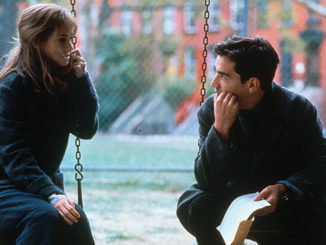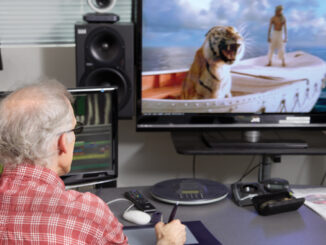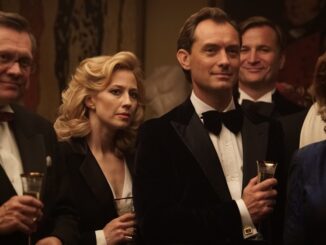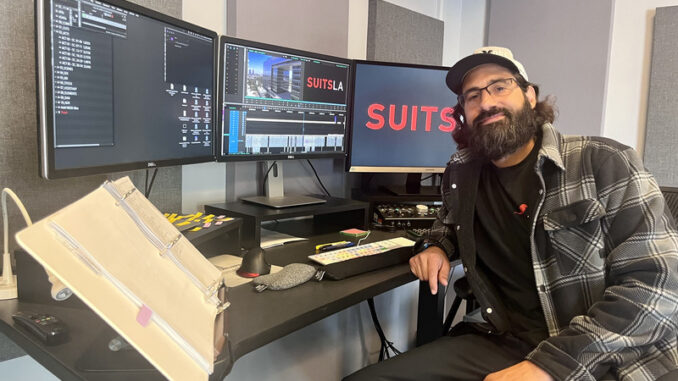
By Kristin Marguerite Doidge
Even though picture editor Dan Rovetto, ACE, grew up in New Jersey—and got his start in entertainment with an internship at MTV in New York City during its heyday—he believes it’s time to bring some more love to Los Angeles. He moved his young family to LA in 2010, and soon after, transitioned into scripted TV, eventually moving up from assistant editor to editing on the hit series “Suits” and several seasons of “Grey’s Anatomy.”
But it was his latest gig editing the pilot and first season of the new spinoff, “Suits LA,” which premieres on NBC on Sunday (and on Peacock on Feb. 24), that helped him realize just how much he has come to love the city he’s called home for the past 15 years.
“It means so much to have the opportunity to help shape the next chapter in the ‘Suits’ franchise,” Rovetto said. “But it’s extra special to work on a series that highlights the beauty of L.A., especially in light of the recent terrible wildfires.”
He said he also felt the “Suits LA” pilot was an exciting opportunity to set the tone for the series’ transition to a new setting while honoring the sharp dialogue and intricate character dynamics that fans of the original series loved—and also to get to re-team with the original show’s creator and showrunner, Aaron Korsh.
“Dan is a tremendous collaborator,” Korsh said. “He has a strong point of view and is willing to express it, but is also willing to explore various ways to go, [he is] a creative problem solver, and is fun to spend large amounts of time with…sure, he’s from Jersey, but everyone has to have at least one flaw.”
CineMontage recently caught up with Rovetto to learn more about what led him to become an editor, his transition to scripted television, and more about the creative collaboration between him and Korsh that’s helped bring his bold vision to life.
CineMontage: Tell us about your early years and how they led you to editing?
Rovetto: Growing up, I remember feeling a lot of pressure to figure out what I wanted to do for a career. The thought of making such a big decision at a young age, and possibly being stuck on a path I wasn’t sure about, felt overwhelming. But what I did know was that I loved being creative, connecting with people, and having a positive impact on their lives. I used to joke that I graduated from Rutgers University with the classic “not sure what I want to do with my life” major of communication, with a minor in psychology.
In reality, I really enjoyed those studies. Understanding myself and others has always been a strong interest of mine, and looking back on it I think it was the perfect degree for me. Having insights into human nature is very helpful in understanding the motivations of a character which ultimately helps inform some of my choices as an editor. At the same time, that understanding is just as valuable when it comes to collaborating with diverse creative professionals.
It was also through the Rutgers communication department that I landed an internship at MTV, which set me on the path to becoming an editor.
CineMontage: Who helped nurture your love for film/storytelling as you were growing up?
Rovetto: My love for storytelling and film started when I was very young. My father was a sheet metal worker by trade, but at home, he was like a mad scientist. Inventive, endlessly creative, and always tinkering with something. He was also a very good self-taught piano player who could pick up just about any instrument. When I was a kid, he would make up these super imaginative stories on the spot for me and my brothers. Family movie nights were also a big tradition in our house and something that has stuck with me over the years.
My father also loved gadgets and had one of the earliest camcorders—the kind where you had to carry a VCR on your shoulder, hardwired to a camera. My brothers and I would get our hands on it whenever we could and make little films and music videos. Looking back, those experiences were probably my first introduction to the magic of filmmaking. The intersection of creativity and connecting with people made editing seem like a natural fit.
CineMontage: How did becoming a father yourself change the way you’ve approached the craft of editing and/or the types of projects you’ve pursued?
Rovetto: Becoming a father had a profound impact on my life and my approach to editing. I was 25 when my first son was born, and five days later, the nurse realized that he had an irregular heart rhythm, and we had to rush to Mount Sinai Hospital in New York City, so he could have open heart surgery and a pacemaker implanted. The doctors were saying that his condition was very rare, and luckily, it all worked out. Today, my son is 20 years old, and he’s healthy with very few limitations. I also have a son who’s 15 years old and a daughter who’s 13.
But that early experience with my firstborn made me evaluate my life and what I wanted for my future, and the future of my family. Having that experience motivated me to be the best father I could be, but I also didn’t want to lose sight of my career goals and my ambitions. So rather than sacrificing one for the other, I think in some ways it made me more determined to pursue my ambitions in the scripted world. I’ve always at least attempted to have the best of both worlds, and sometimes it doesn’t work out, and sometimes it’s really difficult, but the effort is always worth it for me.
CineMontage: How did you first get involved with the original “Suits” series?
Rovetto: I first joined “Suits” back in 2012 as an assistant editor during its second season. At the time, I had recently moved to Santa Monica from New Jersey with the goal of breaking into scripted television. I had started my career in entertainment at MTV in New York City, which is where I got my first taste of editing and immediately fell in love with the craft.
After making my way up to editor in the reality television world, I decided that I definitely loved editing…but my real passion was in the scripted shows and films I used to watch with my father as a kid, whether it was “Quantum Leap” or “Star Wars Episode VI: Return of the Jedi,” it was the blending of written narrative and the artistry of visual performance that really ignited my creativity. So, before I went too much further down the reality path, I made the decision to do whatever it took to break into the world of scripted TV.
Turns out what it took was moving my pregnant wife and two young boys 2,700 miles across the country away from anyone we knew. I was working as an assistant editor in reality TV…at night. Although at times it felt like a step back, I knew what my goals were, and working at night actually turned out to be a huge blessing in disguise. It afforded me the opportunity to use my days networking and shadowing assistant editors in the scripted world. It was during one of those shadowing sessions that I met the editor who would give me my break into scripted TV and ultimately go on to become one of my biggest advocates and closest friends: Peter Forslund, ACE.
I’d also like to shout-out Lori Jane Coleman, ACE, who introduced me to Peter, and who was running the American Cinema Editors’ Internship program at the time I was considering moving to Los Angeles. Knowing I had her support made all the difference and reassured me that if I went after my dreams, I’d have a real shot at making them happen. She was my very first mentor and played an instrumental role in the earliest parts of my career. Jenni McCormick, executive director of ACE, was also a huge support back then, and continues to be to this very day.
CineMontage: What else should we know about the creative and collaborative process behind “Suits LA”?
Rovetto: During my time assistant editing at “Suits,” I took any opportunity to make a name for myself as an editor. Eventually, I got to cut my first full episode during the back half of Season Three, my second episode during Season Four, and then when Season Five came around, I officially started as a full-time editor on the series. I was fortunate enough to work on some of the show’s biggest episodes—season premieres and finales, the embedded pilot for “Pearson,” and ultimately the “Suits” series finale, which took place in its ninth season.
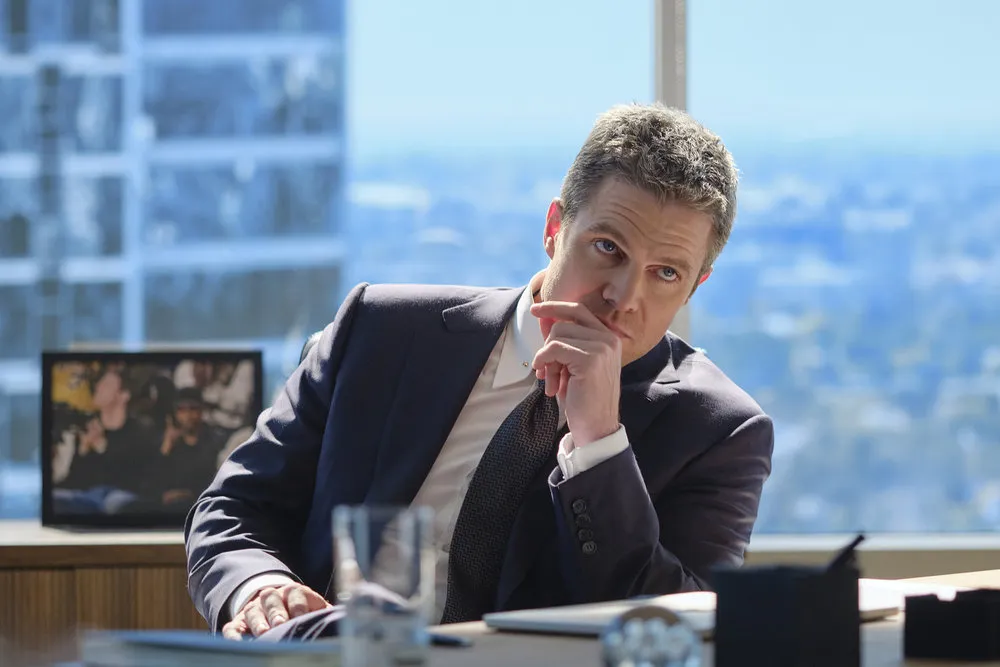
If there’s a list of the hardest working showrunners in Hollywood, Aaron Korsh should be on it. I believe his work ethic was a huge part of the success of “Suits.” He truly leads by example. When it was time to work on the pilot for the new show, we leaned on years of experience working and crafting stories together. I cut more than 30 episodes of “Suits,” which meant that Aaron and I had built a strong relationship in the edit bay. Over time, I really honed in on his storytelling sensibilities and his desire for working efficiently, and we developed a great creative shorthand after working together on some of the biggest “Suits” episodes. Tackling these high stakes episodes gave us the confidence that we could draw on our experience to give the “Suits LA” pilot the best opportunity for a greenlight.
CineMontage: What’s your current setup like and how does it help you succeed as an editor?
Rovetto: I cut the “Suits LA” pilot at the gorgeous Fox Studio lot in Los Angeles. I had the option of partially editing from home, but I’m someone who definitely relishes collaborating in person whenever possible. My editing setup was pretty standard for the most part: We were running Avid Media Composer 2023 along with the Nexis storage system.
I also like to have After Effects and Photoshop at hand in case I want to attempt any advanced temp visual effects. In my opinion, the real X factors in my arsenal are my programmable peripherals and macro software. Keyboard Maestro allows me to combine multiple keyboard combinations into the press of one key. My Megalodon Triple Knob Macropad and programmable mouse give me even more macro options with extra sets of keys helping me cut as efficiently as possible, leaving more time for the creative. More than anything, I’m just grateful to still be a part of this industry and to have the opportunity to continue to grow as an editor and do the work that I love.
This interview has been edited for length and clarity.
Kristin Marguerite Doidge is a frequent contributor to CineMontage and the author of “Nora Ephron: A Biography.”


